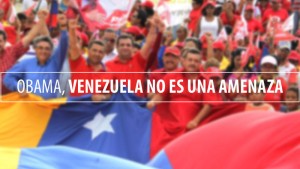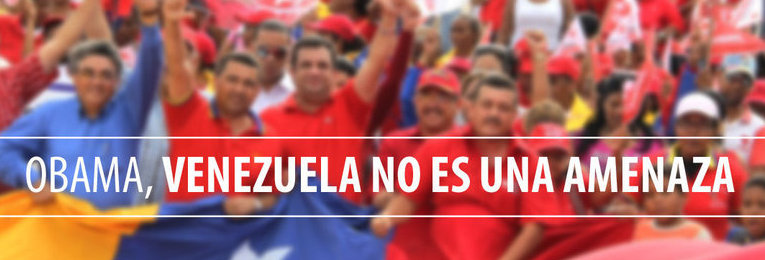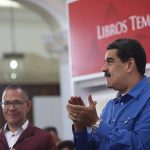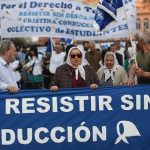VENEZUELA IS NOT A THREAT, IT IS A HOPE –
16 years of progress in socialist construction –
Les Posadistes.com –
9.3.2015 (Extracts)
In the course of 16 years of Bolívarian revolution, Venezuela has endured constant destabilisation attempts from the right or extreme right – military or civilian: repeated State coups, economic wars, organised violence and sabotage, conspiracies, the murder of Chavist leaders and journalists, and attacks against the population.
The latest attempt was foiled on 12 February 2015, which was Victory Parade Day in memory of the 1000 students in Caracas who defeated Spanish troops in the War of Independence. On 12 February 2015 young officers of the Armed Forces had been primed to bombard strategic centres of the capital; assaults were planned against the Latin American TV TeleSur, the National Assembly, the Presidential Palace and the Defence Ministry. This was in connivance with a political coalition ranging from Social Democrats to the extreme right, headed by the Mayor of Caracas, Antonio Ledezma. This latter had already organised acts of violence in 2014, some having caused the deaths of 43 citizens. Leopoldo Lopez, leader of the ‘Popular Will’ Party, found to have been involved, was arrested on 20 February 2014. He has now joined Ledezma in prison.
The aim of this new State coup was to install a ‘Government of Transition’ whose manifesto had appeared one day before in El Nacional, the main opposition paper. The Manifesto was an ‘appeal to the Venezuelans for a National Agreement of Transition’. It stipulated the removal of Nicolas Maduro regardless of his legal right to tenure up to 2019.
Even the observers of the European Union and of the organisation of the American states (OAS) recognised the electoral system of Venezuela as legitimate and transparent. Even Jimmy Carter praised this system as best in the world. It has, indeed, an unsurpassed record of 19 electoral consultations in 15 years. In 2011, the Foundation for the Advancement of Democracy (FDA) granted first place to Venezuela for ‘its respect of the fundamental norms of democracy and social equality’. Along with many other international organisms, the FDA recognised that “when it comes to citizens’ confidence in democracy, Venezuela is top of the league in Latin America”.
[..] For all their aborted attacks on the Venezuelan government, the right-wingers are increasingly incapable of mobilising their ranks. Hence they seek help from external meddlers to continue their war against their people. Their appeals for ‘peaceful assemblies’ are not fooling many people these days. All they do is incite riots and new acts of violence aimed at spreading fear. Aware of mortal danger, the population keeps reiterating in the streets with peaceable firmness, its will and determination to defend the economic, political, social and cultural gains of this Bolivarian Revolution.
 On 28 February 2015, an immense popular mobilisation flooded the streets of Caracas in opposition to the meddling of the United States. Against the [freshly imposed] US sanctions on Venezuela in violation of international right and the administration of Nicolas Maduro, the latter announced several measures in response: functionaries complicit in acts of terrorism (GW Bush, Dick Cheney, the ex-director of the CIA and others) will be denied entry on Venezuelan soil. There will be a balance of representation in the embassies presently containing 17 Venezuelan diplomats in Washington against 100 US ones in Caracas. Parity will now be imposed for entry-Visa payments, and US functionaries wishing to meet at the US embassy in Caracas will have to seek permission beforehand.
On 28 February 2015, an immense popular mobilisation flooded the streets of Caracas in opposition to the meddling of the United States. Against the [freshly imposed] US sanctions on Venezuela in violation of international right and the administration of Nicolas Maduro, the latter announced several measures in response: functionaries complicit in acts of terrorism (GW Bush, Dick Cheney, the ex-director of the CIA and others) will be denied entry on Venezuelan soil. There will be a balance of representation in the embassies presently containing 17 Venezuelan diplomats in Washington against 100 US ones in Caracas. Parity will now be imposed for entry-Visa payments, and US functionaries wishing to meet at the US embassy in Caracas will have to seek permission beforehand.
On 9 March 2015, the United States escalated their war on Venezuela when Barack Obama decreed “a state of US national emergency in the face of the unusual and extraordinary threat posed by Venezuela to our national security and external policies”. This declaration provoked the immediate reaction of the Union of the Nations of Our South America (UNASUR) composed of 12 countries: Argentina, Bolivia, Brazil, Colombia, Chile, Ecuador, Guyana, Paraguay, Peru, Suriname, Uruguay and Venezuela. UNASUR called an emergency meeting in Quito on 14 March 2015. There, the organisation rejected unanimously the decree of the United States. It saw in that decree “a threat of intervention in violation of the principle of national sovereignty and non-intervention in the internal affairs of other States”. Following this, it was the turn of the Community of the 33 States of Latin America and the Caribbean to meet (CELAC), along with the 134 members of the G77+ China. They all confirmed their repudiation of this US attack on Venezuela. A parallel was drawn with the 1973 State coup in Chile against Salvador Allende.
A new relation of forces is now spreading in the world. There have been many mobilisations in defence of Venezuelan democracy in Brazil, Argentina, Bolivia, Ecuador, Nicaragua, Cuba and the world – Europe included. By the 5th March 2015, a world petition had already collected 5 million signatures to repudiate the US decree. The general secretary of UNASUR himself, Ernesto Samper, rejected the unilateral measures taken by the government of the United States against Venezuela: “The [new] agenda of relations between the US and Latin America could start with no more North American military bases in South America”, he declared.
The arrogance of American imperialism is infinite in the matter of imposing its will on States that do not share its economic and political concepts or do not admire its rule changes in its world game. The US sees a menace to itself in each and every step Venezuela takes in the direction of Socialism. This is so because the example of Venezuela encourages the formation of governments opposed to North American hegemony. For Venezuela showcases another conception of society where social right and citizen participation are at the core of its actions.
The statistics show that in 20 years, the country improved enormously: in 1990, 30% of the population sat on 61% of the national wealth. The majority of the country had no right to education, health, security or work. There was no access to proper food, leisure or culture. The first task of Hugo Chavez was to respond to the vital needs of the population by eradicating poverty. On 27.2.2007, he established State control over oil production to redistribute the revenues in favour of the population. He implemented a programme where 60% of GDP went to social investments with house building, free public services, and health and education for all.
At the end of 2014 Venezuela was one of the rare countries, perhaps the only one, to have pushed back unemployment (now standing at 5.5%), [..], raised the minimum wage and indexed it on the cost of living. In January 2015, the minimum wage rose by 15%. In 2013 the organisations of the United Nations for Food and Agriculture (FAO) saluted the eradication of hunger in Venezuela, and the installation of free and public education for everyone at all the levels, primary, secondary and higher; it also saluted the improved right to work and job security in the public and private sectors.
The vast plan of 600,000 new homes was fulfilled and the homes were handed over. Another 400,000 will be finished in 2015.
We salute the creation of the Communes and the Communal Councils for Popular Power. We salute the respect granted to the rights of women, of the ecologists, the disabled, the homosexuals, the Peasant Collectives, and all the Community Associations of the country.
The constitution of the Bolívarian Republic of Venezuela was built around the principle of “a State fighting for the general good”. In concrete terms, this means that the riches are now invested for social purposes at a level of 62.46% instead of 36.82% before the Revolution. This is how Venezuela pushed extreme poverty back from 49% to 19% between 1998 and 2013. This is how Healthcare Centres have sprouted all over the country at a growth rate of 150%, whilst Education Centres have grown by 188%. It was in 2005 that UNESCO declared Venezuela officially “free of illiteracy”.
The right for everyone to education, culture, sports, communication, information, housing and proper food – along with the right to age with dignity – allows the extraordinary flourishing of all those who had been shut out from these things in the past. This is how women always faced with the double oppression of woman and peasant-woman can now write magnificent poems. They use these poems as tools of struggle where criticism and self-criticism serve to change the course of society, to stop the perpetuation of patriarchy and machismo.
Here goes a sample:
“They wanted us in the house, mending away, obedient and in painful birth-giving, mumbling to the last: Yes father, yes husband, yes God….
Our wombs are full, but of grenades, banners and munitions instead of scapulars and rosary beads. Or maybe all these things, but dignified.
And no longer mute, we march on.
They wanted us mute, but now we sing.
They wanted us in tears, but now we are rivers.
They wanted us submitted, but now we resist. Forward we go, at the head of the combat….
They wanted us as silent breezes, but now we are the wind”.
These are conquests on the economic and social planes, and they must now be defended. Imperialism will use every means to belittle them and force them to retreat. The building of a socialist Venezuela where the human being is central – instead of money – needs the support of all the progressive movements of the world.
This is why we defend the idea that, for humanity, Venezuela is a real sign of hope. As the world petition says: Obama: Withdraw immediately the Executive Order against Venezuela! VENEZUELA ES UNA ESPERANZA, NO UNA AMENAZA!
Translated from ‘Les Posadistes.com’ – 9.3.2015


















